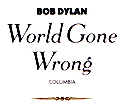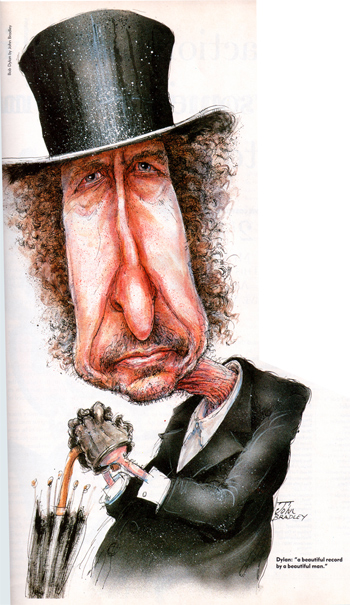| |
|
|
 Hear this man do it, and take courage - By Robert Wyatt - Mojo - December
1993
Hear this man do it, and take courage - By Robert Wyatt - Mojo - December
1993
December 1993 BRINGING IT ALL BACK HOME
A review of recent releases
I JUST REALISED, THIS MOJO IS MEANT TO BE about rock'n'roll, so I'm shafted before I start, really. I like to roll with the best of them, but the rock face feels too flinty to me, the backbeat that an idiot couldn't lose. So what are my qualifications, or Dylan's for that matter?
Well, I did shell out for a Chuck Berry cassette at
Tesco's a couple of weeks ago, and Broke Down Engine from this World Gone Wrong record could almost be one of the tunes on it. There's no rhythm section on the Dylan album, though; if you want that, you could just thump along on the table-top with Dylan's rhythm guitar, reverse karaoke style. But before I get stuck in... all I really want to say is... order this from your local municipal library's record department now. (CDs etc are far too expensive, and it's not as if the musicians get most of the money.)
World Gone Wrong is a beautiful record by a beautiful man. Readers in a hurry, I have to tell you: that's the review, really. The rest is indulgent speculation. Like a lot of our timeless heritage, folk music as a form was invented in the 19th century — in this case by a German musicologist who was getting his lederhosen in a twist, mourning the destruction of rural culture by the all-engulfing hell of the industrial revolution.
The English-speaking tradition, or at least what I've come across of it, was word-based, and that's been its fundamental limitation, musically.
|

|
(Maybe real authorities like Karl Dallas and Ian A. Andersen would baulk at that. I dunno).
I do know that, as a lad just getting into my teens while Robert Zimmerman was already getting out of his, I could hardly breathe under what felt like the dead weight of the sex-free rhythms, the solemn tremolo, the heavy pauses for emphasis of significant words, the hushed and reverent gatherings. And even worse, the desperate, flushed lurches into Shakespearean mirth. All so uncool!
Don't get me wrong, I don't remember feeling rebellious against it, or wanting to hear fellow adolescents share their teenage angst with me; nor was I easy prey for the new-generation-as-a-tribe marketeers. I was too wary for that. It's just that in the search for musical and cultural stimulus, 'folk music' gave me harmonic claustrophobia.
But of course I didn't know the half of it, and researchers with ears more blessed than mine had already brought precious gold up from rich seams where I'd only seen the dull earth on the surface. In Britain, A.L Llyod begat Annie Briggs and Dick Gaughan; in America Alan Lomax led, in a way, to Leadbelly, to Woody Guthrie, to Bob Dylan. The term 'melting pot', may be a cliché, but it's not a bad metaphor for American culture.
Watching a recent telly film exploring Highway 61, I found out that I could, after all, have identified with the schoolboy Zimmerman if I'd known then about his early 'reference library' and the breadth of his discoveries. Apparently, he never just stuck his nose in the archives, valuable as they might have been. For example, he was a right little rhythm & blues fan way back.
Perhaps that doesn't surprise you, but it was a nice surprise to me. This bloke then descended on New York's already potent folk revival, well tooled-up, self-educated in a living folk culture, ready to cross the bridge already knocked up by Woody Guthrie and his pals, and ready to revitalise old people's fading dreams.
But isn't the point about Bob Dylan that he was what Americans call a 'radical'? An original? Well... 'radical' does mean 'starting again from the root'. And then, isn't the point about him that he is a poet, just as Johnny Cash said he was? Well, no, I don't think it is. I think the point is this: the innovation, if you like, is and always has been in his curiously modest and unpretentious singing. It's the way he tells them, that makes it all his own.
He made it new because he wasn't just another necrophiliac; he didn't embarrass the shit out of everybody by acting out some pious reverie, or by pretending that he really was the son of Victoria Spivey. He had the nerve to draw on history as a living stew-pot. Right from the start.
And that's why, when he sings from the tradition, it's just as good as when he uses his own compositions. He can write as well as anybody, but he doesn't have to. He is a complete musician.
World Gone Wrong finds Dylan strumming again through songs from what he sees as his tradition. It is still, totally, a Bob Dylan record. Hear this man do it, and take courage. How great it could be if everybody struggling to find their own voice were able to just sort of stop struggling and.. well, use their own voice. We all got one, unique as a fingerprint.
|





